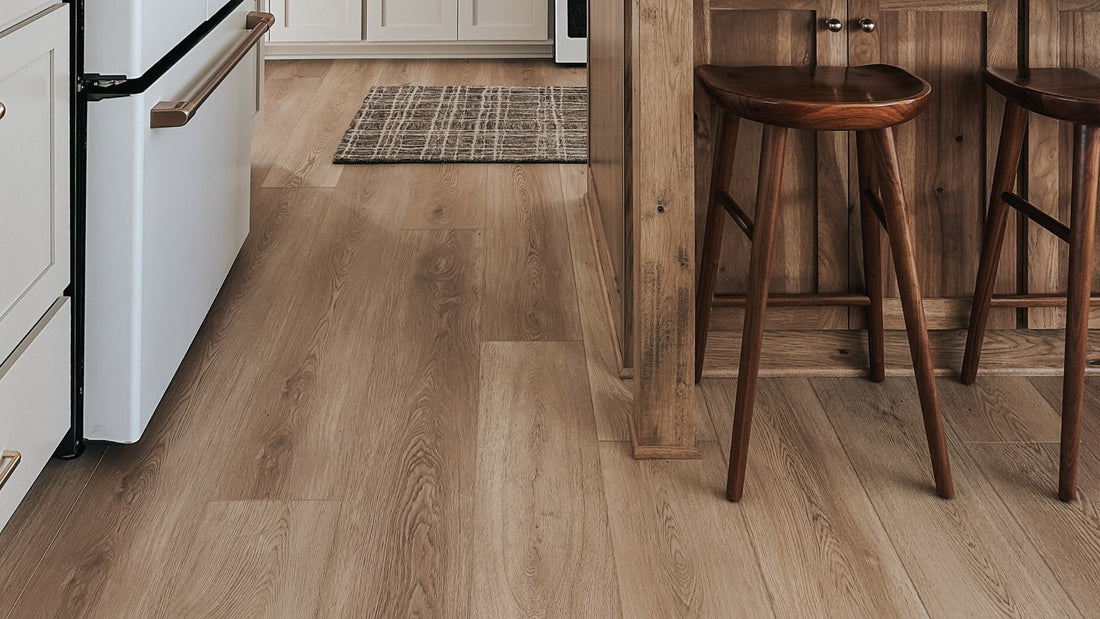Selecting the right flooring for your home involves considering various factors like durability, aesthetics, and maintenance. Both Stoneform® and tile offer unique benefits, but understanding their differences can help you make an informed decision. In this blog post, we'll compare Stoneform® flooring against ceramic and porcelain tile flooring.
Durability and Stability
Stoneform® Flooring:
- 5mm thickness and 30mil wear layer for exceptional durability.
- Highly resistant to heavy traffic, dents, and scratches.
- Rigid core construction ensures stability in both residential and commercial applications.
Ceramic/Porcelain Tile Flooring:
- Extremely durable and resistant to wear and tear.
- Porcelain is denser and less porous, offering greater durability.
- Resistant to scratches and dents but may chip or crack under heavy impact.
Water Resistance
Stoneform® Flooring:
- 100% waterproof, ideal for moisture-prone areas like kitchens, bathrooms, and basements.
- Stone composite core prevents water penetration, protecting the subfloor.
- Reduces the risk of mold and mildew.
Ceramic/Porcelain Tile Flooring:
- Highly water-resistant, suitable for wet areas.
- Porcelain tiles offer superior water resistance due to low porosity.
- Requires periodic sealing of grout lines to maintain water resistance.
Aesthetic Appeal
Stoneform® Flooring:
- Mimics the natural look of hardwood with high variability in plank appearance.
- Offers 20 unique plank designs amongst each color and a wide range of color options.
- Provides a warm, natural feel that enhances any space's aesthetic.
Ceramic/Porcelain Tile Flooring:
- Available in a wide array of colors, patterns, and finishes.
- Can replicate the look of stone, wood, and other materials.
- Design possibilities are virtually limitless, allowing for diverse styles.
Comfort
Stoneform® Flooring:
- Its core provides a solid feel underfoot and will not crack as it is walked on.
- Warmer and more comfortable than ceramic or porcelain tiles.
- Ideal for living spaces and bedrooms, especially in colder climates.
Ceramic/Porcelain Tile Flooring:
- Hard and can feel cold underfoot.
- May be uncomfortable in cooler environments.
- Considered less comfortable for standing over long periods, such as in kitchens.
Cost
Stoneform® Flooring:
- Generally more affordable than ceramic or porcelain tiles.
- Easier and quicker installation reduces overall costs.
- Lower labor costs due to the simple installation process.
Ceramic/Porcelain Tile Flooring:
- Typically more expensive, especially for high-end tiles.
- Professional installation often required, adding to the overall cost.
- Higher overall investment due to material and labor expenses.
Maintenance
Stoneform® Flooring:
- Waterproof nature makes cleaning spills and stains easy.
- Maintains a long-lasting appearance with minimal effort.
Ceramic/Porcelain Tile Flooring:
- Low maintenance, but grout lines require regular cleaning to prevent staining.
- Periodic sealing of grout helps maintain its appearance.
- Easy to clean but may involve more upkeep than Stoneform® flooring.
Installation
Stoneform® Flooring:
- Click-lock installation system is user-friendly and quick.
- Suitable for DIY projects, even for those with minimal experience.
- Requires only basic tools for installation.
Ceramic/Porcelain Tile Flooring:
- More labor-intensive and usually requires professional installation.
- Involves laying tiles with mortar, grouting, and sealing.
- Time-consuming and potentially costly, especially for intricate designs.
Choosing between Stoneform® and ceramic or porcelain tile flooring depends on your specific needs and priorities. If you require maximum durability, water resistance, and low maintenance, Stoneform® is an excellent choice. Its advanced features and realistic aesthetics make it ideal for both residential and commercial applications, especially in moisture-prone areas.
On the other hand, if you prioritize a versatile range of design options, heat resistance, and longevity, ceramic or porcelain tile is a great option. It offers a timeless appeal and can withstand heavy use and exposure to water.
Both Stoneform® and ceramic or porcelain tile have their advantages. By understanding their differences, you can make an informed decision that best suits your flooring needs and preferences. Both options can enhance the beauty and functionality of your home.
For more information on how Stoneform® stacks up against other flooring options, check out our detailed comparison guides. We cover everything you need to know about Stoneform® vs. LVT, Bamboo, Laminate, Tile, and Hardwood, so you can make an informed decision for your home. Curious about overall costs? Our Cost Comparison: Stoneform® Flooring vs. Other Flooring Options breaks down expenses to help you find the best value for your space. Explore these resources to see why Stoneform® might be the perfect fit for your next project.

